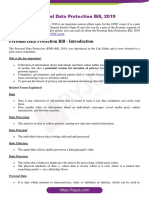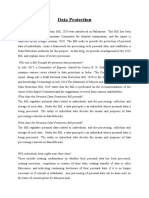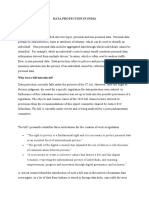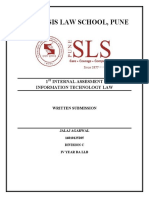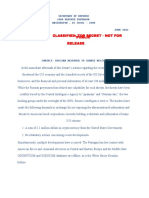0% found this document useful (0 votes)
21 views5 pagesPersonal Data Protection
The Personal Data Protection Bill, 2018 aims to address the inadequacies of current privacy laws in India by establishing a legal framework for the protection of personal data. It introduces key concepts such as Data Fiduciary, Data Processor, and Data Principal, and emphasizes the necessity of explicit consent for processing personal data. The Bill also outlines the rights of Data Principals, conditions for data transfer outside India, and exemptions for law enforcement, ultimately promoting a new data privacy regime focused on trust and accountability.
Uploaded by
Madhavan Namboothiri MCopyright
© © All Rights Reserved
We take content rights seriously. If you suspect this is your content, claim it here.
Available Formats
Download as TXT, PDF, TXT or read online on Scribd
0% found this document useful (0 votes)
21 views5 pagesPersonal Data Protection
The Personal Data Protection Bill, 2018 aims to address the inadequacies of current privacy laws in India by establishing a legal framework for the protection of personal data. It introduces key concepts such as Data Fiduciary, Data Processor, and Data Principal, and emphasizes the necessity of explicit consent for processing personal data. The Bill also outlines the rights of Data Principals, conditions for data transfer outside India, and exemptions for law enforcement, ultimately promoting a new data privacy regime focused on trust and accountability.
Uploaded by
Madhavan Namboothiri MCopyright
© © All Rights Reserved
We take content rights seriously. If you suspect this is your content, claim it here.
Available Formats
Download as TXT, PDF, TXT or read online on Scribd
/ 5



